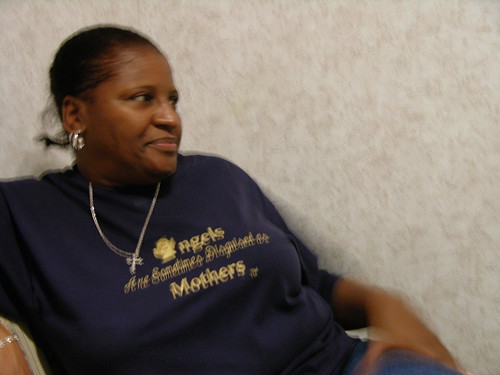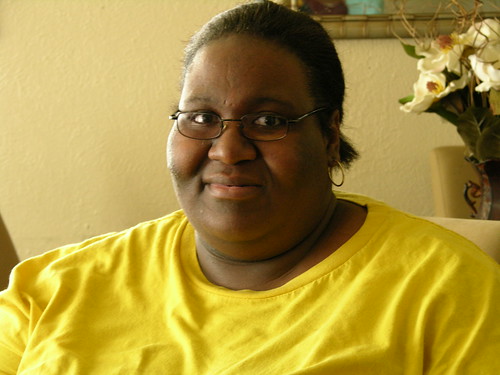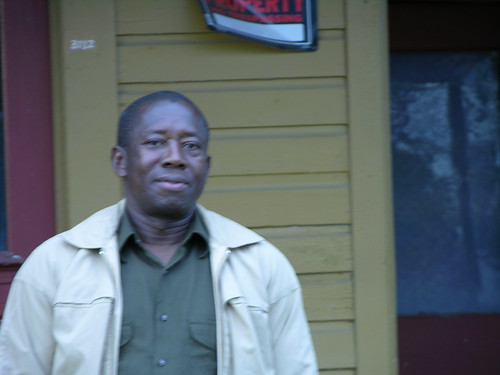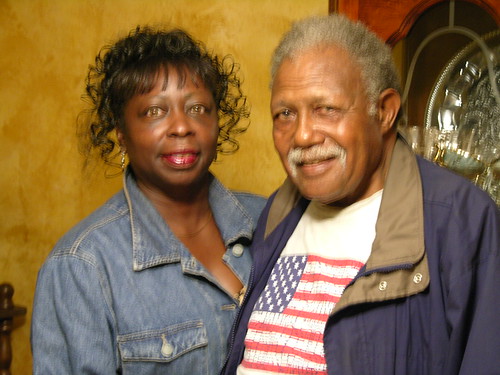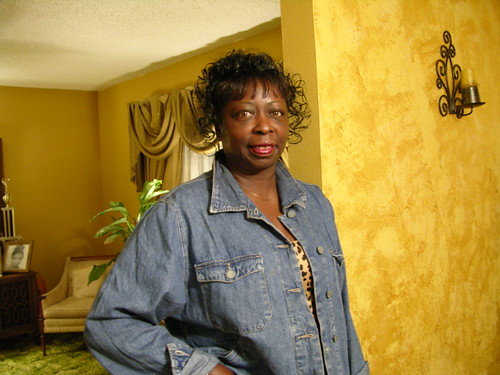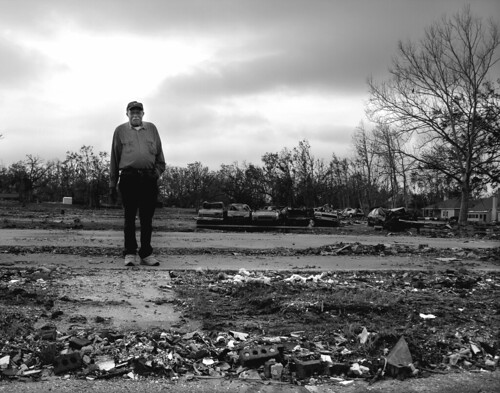
Subscribe to Dollars & Sense magazine.
Subscribe to the D&S blog» 
Recent articles related to the financial crisis.
Saturday, February 18, 2006
Sharon Hanshaw: "The water stage is over."
by Ben Greenberg
Helping people doesn't mean give them a tent, or give them some water. The water stage is over with. It's time to build somebody some houses. It's time to give somebody some stability.
You gonna need a car to get to work. You gonna need some kind of bus system that goes all the way to where the jobs are. Everybody wants to work. Jobs are here. But you can't get there if you don't have a car. And most people have lost their automobiles.
Like I explained to the FEMA guy, I'm not askin' you to give me anything. I'm tellin you I had stuff and I think my stuff is worth somthin', and if this emergency fund for to aid people, then that's what you should do with it, cause that's what you say it's for.
Their main thing is tearin' down houses and building condos, building casinos. The homes are not their first priority. Their first priority is casinos. So they say, oh let's just do casinos: that'll give 'em work. But they have no car. They have no home. How they gonna come to work?
Please consider donating to Dollars & Sense and/or subscribing to the magazine (both print and e-subscriptions now available!).
2/18/2006 09:21:00 PM 0 comments
 
Saturday, February 11, 2006
Local Photo Exhibit of Images from the Gulf Coast
by Ben Greenberg
 While I was in Gulfport, MS, I had the pleasure of meeting photographer and activist, Lolita Parker, Jr., who is from Boston and has, since October, been spending 13 days per month in Gulfport, taking photographs and assisting Derrick Evans with Turkey Creek Community Initiatives. Lolita has an exhibition of her photos from the Gulf, " Heartbreak, Hope & Healing," at the West End Branch Boston Public Library, through February 25, 151 Cambridge Street, Boston, MA 02114. For more information please call 617-523-3957. There is a reception Thursday, February 16, 6:00 - 7:30 PM. I've seen some of Lolita's photos, and they are great—and so is she. You can check out her professional website and her photo blog to see more of her work. ~ Photo: By Lolita Parker, Jr. Oct 27th, 2005 – Gulfport, Mississippi: Mrs. Christene Brice (far right) of Worker’s Helping Youth (WHY) recounts human rights violations endured by residents of Gulfport’s Edgewood Manor in the days and weeks following Hurricane Katrina.
Please consider donating to Dollars & Sense and/or subscribing to the magazine (both print and e-subscriptions now available!).
2/11/2006 09:03:00 AM 0 comments
 
Friday, February 03, 2006
Shone (II): "He was like, no, I can't see it, I don't have time."
by Ben Greenberg
Shone's terrible experience did not end when the water receded from her mother's house. This part of her story picks up later in the day on August 29, 2005, after Hurricane Katrina had died down: We sat in the livin' room for a while. We was like, nobody's gonna be able to move around until tomorrow. We started planin' to find some dry stuff to make beds and stuff like that. And I was sittin' on this cooler, but it was like right by a window. And I told my friend, he was sittin' on a refrigerator that floated from the kitchen to the living room. The blind was still down, and I was like, I see some'in' green movin'. I said, look out that window. He was like, I don't think nobody out there. My mama was like, nobody's out there. And he lifted up the window. He said, yeah there some people out here. And we started yellin' help, and they came over. It was some firemen. And they was like, do y'all wanna get out. You was like, yeah, there's nothin' else for us to do in here. Yeah, we want to get out, we definitely want to get out.
They had to take us out and take us around this house we had smashed into. It took me so long because none of us had shoes, and the mud was so thick, we kept slidin'. So I was like, I'm a get off the concrete sidewalk. I'm a walk in the grass. And it would be better for me. A few feet more, I fell in a well up to my neck.
So we sittin' there. I'm tryin' a get out the well. They was pullin' me. I was like, let me go. Let me pull out the well with just my arms. And this other fireman came runnin' over, and he was like, where is the hole, I don't see the hole. He fell in a hole, in the well with me.
So finally we got out the well. He was like, you not gonna be able to walk through here without no shoes on because nails and boards was everywhere. He was like, I want you to sit on this porch, and he was like, we gonna come back and get you. And he ran up to the front, he told my friend, we need you to sit here with her. We gonna send somebody back for y'all.
We set there until 9:00 the next day [Tuesday morning].
But there was nowhere to go. Everything was down. Trees was down. One end of the street was blocked. We couldn't get through it cause trees and boats and stuff was every where.
So we set there and set there. They never came back and got us. They never came back to check on us. So finally I was like, we can't stay down here no longer. I said, it's gettin' dark again. Cause I was scared that night, because anythin' coulda happened down there. So I kept askin' people, and people was like, I don't have a car, I'm just tryin' to get through here to check on my house, this and that.
Finally I said, here come a ride. It was a state trooper.
Next door to my mom lives a state trooper. And over on the other side of the street is a state trooper. I went to school with them. So when he pulled in I said, Jason. I said, could you please give me a ride outa here. He was like, no, I can't see it, I don't have time. He was like, I got things to do. He was like, no. I said, I need a ride outa here. I said, I've been down here all night. He said, I can't see it. I called him by name because, like I said, I watched him grow up.
So he went around the corner, and when he came back I was still standin' on that corner. He at least had two people on a side of him, and it was like five in the back. Filled up his car with white people.
And he just rode off. I set there like three more hours, and finally a guy and his wife came through and gave me a ride home.
I thought I was gonna have to stay there all night. Technorati Tags: east biloxi, katrina, mississippi, racism
Please consider donating to Dollars & Sense and/or subscribing to the magazine (both print and e-subscriptions now available!).
2/03/2006 04:15:00 PM 0 comments
 
Shone (I): "The wind was blowin' so hard, we thought those kids was gonna get blowed out the attic."
by Ben Greenberg
the peninsula that juts out between the Back Bay and the Gulf of Mexico, where Biloxi was first settled and where Old Biloxi is located... "The Point" is where our seafood industry started, and where all of the seafood factories were until casinos came in and took their places, and where a few still are located if they are still standing. Shone had her six children—ages two, three, four, six, thirteen, and sixteen—with her at her mother's house. Also with them were one of Shone's sisters, age thirty-four; two of shone's nephews, ages four and six; and Shone's friend, age twenty-eight. Shone is thirty-two years old. This excerpt from her story begins on Monday morning, August 29, 2005. I got up around 6:30 or 7:00 and I went into the bathroom to take a bath, and I was in there for like twenty minutes, and when I came out, it was a mess . That's how quick it came. That's how quick the storm came. And my mom was standin' there, and she was like, I think y'all, I think you need to come to the living room. We all need to be in one room. And we all went in the living room and set down.
One of my kids was looking out the window and she was like, the yard next door is flooded. So we got up and looked out the window, and it was flooded, but my mom said it always happens. Then about five minutes later, my other daughter say, ginny, it's water on the floor of the kitchen. And she [Shone's mother] said, it always happens, it does that. That door leaks. Just a matter of seconds, my other daughter got up off the floor and said ginny, I don't think so. There was water runnin' under the TV. It was pushin' the TV to the couch. That's how quick the water was comin' in.
By this time we thought it would be safer if we took the kids back to the back room and start puttin' em up on the washer and dryer. While we was back there, I was sittin' on the couch. The water was comin' up on my legs. And it looked like the house was gettin' ready to flip over. So my sister was like, I think we need to get these kids to the attic. So we all started passin' the kids to get them to the attic. We got 'em up in the attic. By this time, one side of the house blew out. That's what made the house level back and not flip over.
And I had all my kids in the attic. My sister was in the attic and my friend was in the attic. But one of my kids didn't go up. The sixteen year old didn't go up. I didn't go up, and my mom didn't go up. And the only reason why my mom didn't go up 'cause she didn't want to leave me down there. But I'm six foot. That water was to my chest in the bottom of the house.
So we waded around in that water. We was listenin' to the radio, hopin' that it would go out. And me bein' hystericcal, I could hear some screamin', and I was like, Mama. I said, there's somebody outside screamin', and she was like no, it was just your imagination. She was like, you havin' one of your attacks. I said, no, I could hear 'em screamin'. And one of those little kids said, I hear a cat outside. That's how I knew I wasn't goin' crazy.
Come to find out it was two little girls who drowned in their front yard.
So we just sat around and sat around. The wind was blowin' so hard, we thought those kids was gonna get blowed out the attic. My sister tried to kick the front of the house out. She was like, it's a boat outside. We gonna try to make to this boat. My mama was like, no, we don't need to separate. If we do, somethin's gonna happen. So waited and waited, waited. Finally that water started goin' out.
It took about two hours for it to go out. When it all went out, everybody was just relieved and drained. But it took two hours for that water to go out of there.
And we opened the door, and the house was in the next yard. The porch was way over there with a boat on it.
The whole house, the whole house. A three bedroom house. It floated to the next yard. That's the only thing that kept us from floating down the street was the next house. It pushed up against that.
I don't ever want to go through that again. Never. NOTES*The link does not reflect the actual street location of Shone's mother's home. The red marker is meant only as a reference point, to indicate the general area of the neighborhood. Technorati Tags: east biloxi, katrina, mississippi
Please consider donating to Dollars & Sense and/or subscribing to the magazine (both print and e-subscriptions now available!).
2/03/2006 02:33:00 PM 0 comments
 
Wednesday, February 01, 2006
Resources
by Ben Greenberg
There hasn't been a lot of effort on the part of government entities. People got the $2000 [from FEMA]. A good number got the $2300 [from FEMA]. Red Cross came in and gave like $360 per person.
But every faith based organization that you could probably name came to our community and helped us. I can't count the number of college students from different colleges that have been there. A lot of faith based, a lot of organizations, a lot of just individuals, but not a lot of government help.
The only time that we saw government help was when Bill Clinton's visit was announced. FEMA came out with a hundred trucks and removed all the garbage and stuff from the street. That was their aid. That was it. And the people were mad for them removing it. We wanted them to see the true condition of the community. So when the cameras came in, it was clean, as if we were doing alright. But in terms of them rendering aid, no.
We live in a city that doesn't have a whole lot of resources, a state that doesn't have a whole lot of resources, and I think in the first week or so everybody was in the same boat, but I think that as time went on that there was selective distribution of whatever resources was available. I'm not so naive as to think that it was equally divided—no. I think there were selective distribution of whatever was available.
We could see other areas with lights, and we didn't have lights. We were like two or three weeks in, and we could see the highway, since our community is only two blocks off the main [Highway] 49, 49 had lights. The businesses on 49 had lights, and we didn't have lights. And you know you really can't function without electricity.
They just wasn't prepared. They didn't have the resources. to contend with something like this. And FEMA was slow. And it did take a lot of protest in order for the agencies that were here to help to get to us. The Red Cross didn't come to our neighborhood until they was pressured to. I think they sort of thought that it would be easy for us to go where ever they were at. I mean those that had cars were probably less than 50% of those people who had cars pre-Katrina. So you know if there was a thousand cars in the neighborhood, there was less than 500, might have been less than 300. We were living under those types of circumstances.
Please consider donating to Dollars & Sense and/or subscribing to the magazine (both print and e-subscriptions now available!).
2/01/2006 04:03:00 PM 0 comments
 
Railroad Tracks
by Ben Greenberg
Carland Baker: Once they kinda got organized and they was pickin' people up left and right, puttin' em in jail. Then they came out with this concertina wire. It's military defense wire, called razor wire. They put this stuff for about twenty miles all down the coast, just about.
Gayle Tart: Like their property was more important than our property, that's the idea you got.
Carland Baker: You had the military police there, you had the city police there, you had the state police there, you had the boarder patrols there, and anybody else you could find, they was all mannin' the corridor.
I myself live across the track in Longbeach, in Longwood. I went back over there to go back over to my apartment. They wouldn't let me cross the track, and I live there. I've been livin' there for ten years about. Well you can't go across. One of the policemen told me, he said go down through Pass Christian and come back up 2nd Street in Pass Christian. Trees, they was all over the place, but we were able to get through. And go back by WalMart, cause I live right across from Walmart. So I went down to Walmart, and that's where I went across. But you couldn't get over on the Longbeach side b/c they wouldn't let you over there.
Gayle Tart: But in the meantime the apartment complex was wide open. So they so interested in the looters on the other side of the track. What about the people who lived on the south side of the track. Like they didn't loot? So your apartment is just wide open. Anybody could walk in your house.
Carland Baker: My problem was I couldn't come over there. They wouldn't let me over there. And it was not reason that I lived there, but just who I was. It didn't make any difference to those guys over there guardin' that entrance. I was Black. And they weren't goin' a let me in there under no circumstance. Technorati Tags: gulfport, katrina, long beach, mississippi, race, racism
Please consider donating to Dollars & Sense and/or subscribing to the magazine (both print and e-subscriptions now available!).
2/01/2006 10:40:00 AM 2 comments
 
Gayle Tart: "you wanna say no, I can't do it, I just can't, not anything else, not another problem, not another person."
by Ben Greenberg
My brother was in the downtown across the track. That track that runs east-west, but it separates north-south. He was on the wrong... well I won't say the wrong side of the track, but he was on the business side of the track, where all the hotels are and the banks, businesses. And he was with this cousin and they were picked up and just thrown in jail. They even maybe might have had a bottle of water or something. They had something that the police didn't think they should have, whatever...
I went to get my brother out and since they knew who I was and knew I was an attorney and knew I had suffered this terrible tragedy, loosing two people in my family, I was able to get my brother and my cousin out. Because I told them, I needed them to help me arrange the funerals of my loved ones. And they were nice enough for me to do that. But walking out the door, I turned to look around, people sayin', Miss Tart, what about me, can you help me?
And it was the wildest time in my whole life. It was 100 degrees. Here it is, the mosquitoes are terrible. It was like the weight of the world is on your shoulders. And I mean you wanna be selfish, and you wanna say no, I can't do it, I just can't, not anything else, not another problem, not another person. But in good conscience, I could not leave the people there that needed legal assistance. I couldn't do that. So that whole week. That was Monday. The whole week from Monday to Friday, I was representing people, trying to get them preliminary hearings. I had not yet buried my brother nor my nephew. I was representing people. Because they just got caught up in it. And I knew the people needed representation. I was sayin' to myself, where are the lawyers? Did everybody leave? And I was the only Black lawyer there. I had at least 100 people I helped.
Technorati Tags: activism, class, katrina, mississippi, gulfport, racism
Please consider donating to Dollars & Sense and/or subscribing to the magazine (both print and e-subscriptions now available!).
2/01/2006 02:54:00 AM 0 comments
 
Nothing like this has ever happened in America
by Ben Greenberg
"Nothing like this has ever happened in America. I mean, to have a house completely wiped off the foundation. You don't even see a refrigerator. You don't see a stove. You don't see a bathtub. It's a clean, level slate. It's just unbelievable. And everybody now is walking around traumatized. Because they can't believe it." (Gayle Tart, attorney and resident of Gulfport, MS) Technorati Tags: katrina, long beach, mississippi
Please consider donating to Dollars & Sense and/or subscribing to the magazine (both print and e-subscriptions now available!).
2/01/2006 02:35:00 AM 0 comments
 
|
|
 While I was in Gulfport, MS, I had the pleasure of meeting photographer and activist, Lolita Parker, Jr., who is from Boston and has, since October, been spending 13 days per month in Gulfport, taking photographs and assisting Derrick Evans with Turkey Creek Community Initiatives.
While I was in Gulfport, MS, I had the pleasure of meeting photographer and activist, Lolita Parker, Jr., who is from Boston and has, since October, been spending 13 days per month in Gulfport, taking photographs and assisting Derrick Evans with Turkey Creek Community Initiatives.
